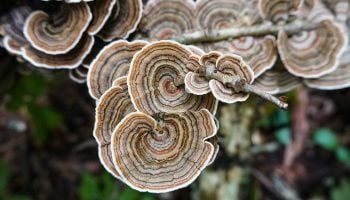SUMMARY
This case report describes how one individual used psilocybin microdoses to reduce a habit of stress-induced smoking and coffee breaks.
Background on case study
Jane*, a mid-career project manager, had a tendency to self-medicate by smoking cigarettes. She was trying to cut this habit, but everyday stress got the best of her.
During family visits, smoking and coffee breaks granted Jane a temporary reprieve from overbearing parents.
“I would go out early in the morning because I didn’t smoke in front of them. I would hide away and have cigarettes,” she recalls.
Over the past few years, Jane had significant experience with some of the most powerful ceremonial psychedelics, including San Pedro and ayahuasca. “The benefits that I saw through psychedelic work were just massive,” she says. These high-dose medicine experiences helped her to grow “emotionally and spiritually.” But she still struggled to break out of her substance dependence.
When an email about Third Wave’s Microdose Experience landed in Jane’s inbox, it felt like a “synchronicity”—this was exactly what she needed at this point in her process. She enrolled in the program and set an intention to reduce her intake of caffeine and nicotine.
“The whole point of setting the intention made such a big difference,” she says. “Because it’s an intentional journey that you’re going on, it’s not just something you do.”
How microdosing made a difference
Under the guidance of Third Wave’s Microdose Experience, Jane began consuming 0.1-0.15 grams of psilocybin every third day—one day ‘on’ and two days ‘off.’ After two weeks, she switched to microdosing every second day. On microdose days, she noticed that her mood was much calmer. From this place of calm, she was better able to resist the urge to grab a cigarette.
The positive effects of microdosing extended into off days as well. On the ‘off’ days immediately following a microdose, Jane noticed an increased activation of her senses.
“I feel more alert, brighter, and energized,” she notes. “It’s almost like the second day has more of an effect on me than the first day.”
Outcomes
Jane’s microdosing protocol helped her to interrupt the cycle of substance dependence. Her caffeine and nicotine habits, once automatic, now felt “more manageable.” This improvement in Jane’s mental wellbeing became particularly clear during a recent visit with her family. Previously, in the pre-microdosing stage of her life, such visits had been a source of stress and a trigger for Jane’s cigarette cravings. This time, however, she was able to effectively manage her stress.
“The whole atmosphere while there was just a lot more gentle,” Jane reports. “There was a calmness that I’d never experienced before.”
During family visits, Jane’s father would often pressure her to eat, regardless of whether Jane was actually hungry. Sometimes his repeated insistence would become overwhelming, and Jane would need to excuse herself and take a smoke break outside. After Jane began microdosing, her window of tolerance increased.
“I just let it be this time around,” she remembers. “I didn’t even think about grabbing a cigarette or wanting to smoke.”
Mindfulness: another contributing factor
The psilocybin microdoses layered onto Jane’s pre-existing mindfulness practice to maximize the benefits for her self-transformation journey. Jane had been using a personal growth learning platform called Mindvalley, which provided a foundation for her meditation practice.
After microdosing, she was better able to deploy the mindfulness techniques.
“The combination of the two, I believe it changes your neural pathways,” she says. “The biggest change that I’ve noticed in myself is being present in my conscious awareness, right now.”
Staying in the present moment meant that Jane would not ruminate about the past or worry about the future. This mindful awareness made it easier to navigate challenging situations, such as her father’s tendency to pressure her to eat.
“In the past, I probably would have gotten upset and thought about all the future stuff and all the past events and all the times that he’s trying to do this, and he was still going to do this,” Jane says. “And it’s almost like the moment you surrender to it, he stops doing it. It’s amazing how the universe works.”

Evidence on psilocybin and smoking cessation
Jane’s story aligns with the growing body of research on psilocybin use and smoking cessation. A 2014 study by Johns Hopkins University found that longtime smokers who used psilocybin in a carefully monitored setting, within the context of a cognitive behavioral therapy program, showed an 80% abstinence rate after six months. A similar 2016 study, which examined psilocybin-occasioned mystical experiences in the treatment of tobacco addiction, yielded the same 80% success rate. In contrast, varenicline, considered the most effective smoking cessation drug on the market, has a 35% six-month abstinence rate.
That being said, psilocybin isn’t a silver bullet approach to cutting substance dependence.
“Quitting smoking isn’t a simple biological reaction to psilocybin, as with other medications that directly affect nicotine receptors,” says Matthew W. Johnson, Ph.D., associate professor of psychiatry and behavioral sciences at the Johns Hopkins University School of Medicine. “When administered after careful preparation and in a therapeutic context, psilocybin can lead to deep reflection about one’s life and spark motivation to change.”
Significance of this case study
This case study highlights the efficacy of allowing different experiences to build on each other. Jane began with high-dose psychedelic journeys, which offered a foundation for spiritual and emotional growth, and later combined a microdosing program with mindfulness techniques to effect practical change in her everyday life.
It’s possible that no single factor on its own would have been sufficient to interrupt Jane’s smoking habit. The sum of her experiences may have been greater than its parts.
Research has highlighted the synergistic effects of psilocybin consumption and mindfulness training on neurobiology. Both psychedelics and meditation decrease activity in the brain’s default mode network—the region responsible for self-referential processing, otherwise referred to as our ‘ego’ or our sense of self. When our sense of self is temporarily disrupted, we are better able to observe the present-moment experience from a nonjudgmental point of view. By stepping outside of our rigid default mode, we create more space for psychological flexibility and new ways of seeing.
A structured approach to both mindfulness and microdosing can maximize the advantages of both practices. Through the complementary support of Mindvalley and Third Wave’s Microdose Experience, Jane was able to experience greater synergistic benefits from both modalities.
*Jane is a pseudonym. Quotes edited for clarity









Another amazing outcome. Just love it. It’s fascinating!